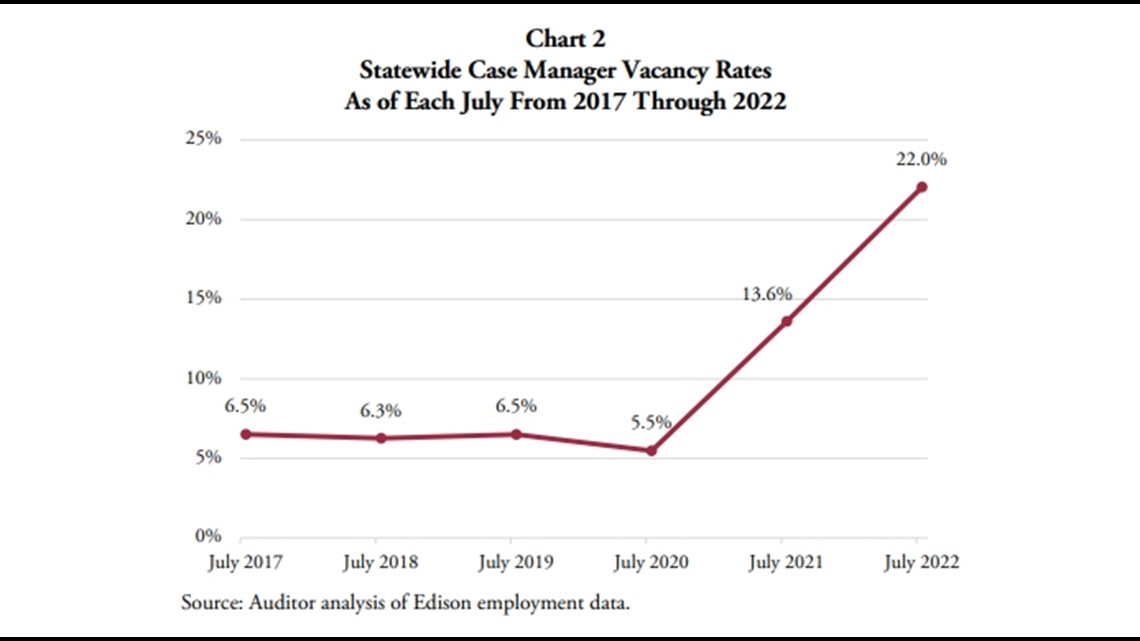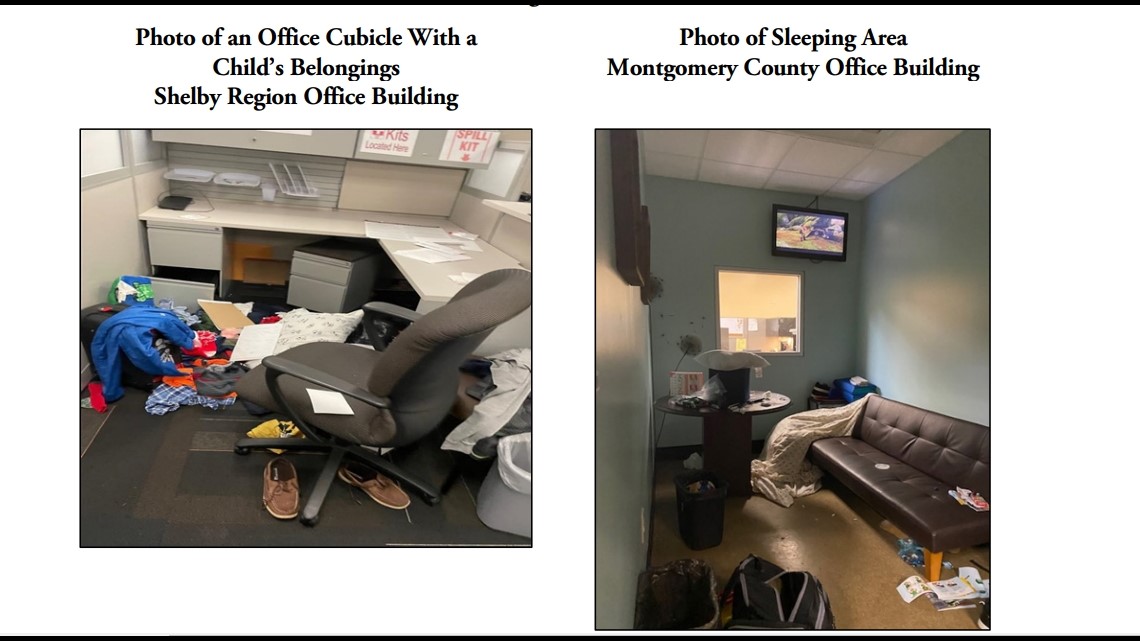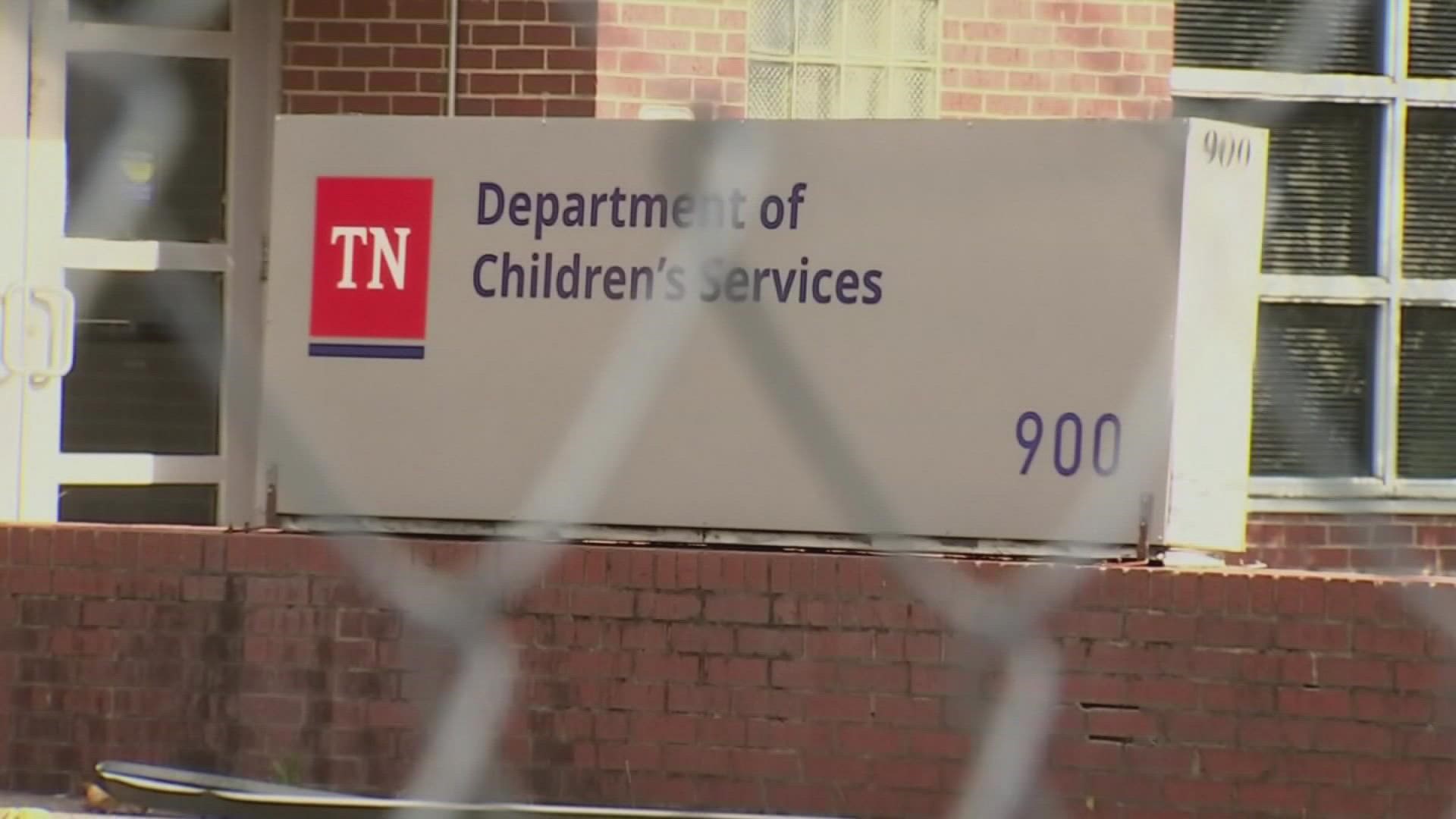NASHVILLE, Tenn. — Weeks after Tennessee lawmakers raised alarms over kids being forced to sleep on the floors in state offices, the State Comptroller's Office released an audit of the Department of Children's Services that found "crisis-level" staffing and placement shortages.
Lawmakers called the situation dire in October, and the new audit revealed Tennessee is running the risk of allowing kids in serious danger of abuse to "slip through the cracks" because case workers are shorter staffed and overworked.
The audit, which took place between Aug. 1, 2020, through Aug. 31, 2022, said it found several key issues:
- DCS did not assess risk or develop controls in "several areas" to fix systematic issues.
- Case manager turnover and employee vacancies at DCS have reached "crisis levels," which it believes is risking the safety of vulnerable children.
- The lack of foster homes has created serious challenges, leading to DCS having to seek temporary placement options in state office buildings and transitional homes for "extended durations."
- The audit found "critical child safety incidents" and risks in several department processes, including:
- Children may have remained in unsafe situations because management did not meet established timelines for child abuse and neglect investigations.
- DCS did not ensure that reported allegations of sexual abuse or lack of supervision for custodial children living in residential facilities were properly investigated.
- DCS hasn't developed an effective process to respond to sexual abuse and harassment allegations.
- Shortfalls in management's Provider Quality Team review process led to the PQT not identifying a questionable provider employee to prevent his contact with children in state custody and avoid child endangerment.
The audit noted DCS case manager caseloads have increased by nearly 63% since Aug. 2020 amid "alarming" levels of turnover in the past two years, saying in some cases support services weren't provided to children. In particular, the audit revealed 97% of new case manager hires left in 2021, meaning DCS was unable to retain the vast majority of its new recruits.
"Given the increasing number of children entering DCS custody, increasing vacancies, and high caseloads, this expectation has set case managers up for failure and only hurts the children when case managers cannot provide children with high-quality support services," the comptroller's audit said.


DCS concurred with the findings, saying it's part of a larger shortage of social workers in the U.S.
"The issues are not just germane to Tennessee; all states are faced with children with increased needs, low staffing, and fewer placement options. Tennessee’s plan to address these issues is to increase salaries, develop a robust case manager training program, increase the network provider rate to increase the available beds for high needs children, and work with providers to develop the programs youth need today," DCS said.
When it came to case load, the report found that case managers were overworked and faced "excessively large numbers" of actual cases in the past two years. In Aug. 2020, 8.3% of cases managers had more than 20 cases a month on their plate. In the two years that followed, those percentages had steadily increased to more than 36%. More alarming, managers handling more than 40 cases a month increased from 0.1% to more than 4% in the span of two years.
The total number of case managers across the state also fell during this period from 1,652 to 1,272. In survey responses, case managers said they faced "impossible" caseloads cross the board.
"Some are on call every week, causing so much paperwork that it makes it getting normal work duties impossible. We are asked to sit with custodial children after hours on a daily basis," one case manager said.
"The high numbers on the case loads are very difficult to manage providing quality services to all of the children and families. 15-20 is not easily manageable and there is always a fear that something will not be addressed timely or correctly," another case manager said.
The report recommended DCS leadership should work with state lawmakers and other agencies to help recruit and retain case managers. The audit also recommended that the DCS Commissioner should work with the Tennessee General Assembly in considering a change to state law that establishes best practices and actual caseload sizes, which DCS management did not comment on.
When it came to child placement, the audit found a declining number of DCS-operated foster home approvals and an increasing number of closures. In 2021, more foster homes in good standing were closed than approved.
Since 2019, DCS has been relying on partnerships with transitional homes like the Isaiah House, which is supposed to be a temporary last resort until it can find long-term placement in foster homes. The audit found these transitional homes were being used for extended durations.
Recently, kids awaiting placement have also been forced to sleep on government office building floors and other temporary settings.


"News articles and televised stories highlighted the urgent need for foster homes while also covering stories about foster parents’ weariness from ongoing calls from DCS asking the families to take more children than they are approved to care for simply because the state does not have enough foster homes to place children," the audit said. "Additionally, foster parents reported a lack of support and communication from DCS once a child was placed in the foster home."
Case managers who responded to state surveys put it succinctly: "DCS has no placements for children."
DCS concurred with the findings, asking for state lawmakers to approve more funding to bolster its budget and expand its capacity for children with higher needs.
"Tennessee doesn’t have a bed shortage, it has a funding shortage. When children step down from treatment facilities, there need to be foster homes or DIDD-supported homes available to house these youth," DCS responded.
DCS also concurred with the state's findings regarding minimizing the use of government office buildings for temporary placements. The state said DCS management should seek extra state and federal funding to "supply temporary settings" to support children that must stay there.
When it came to how DCS failed to adequately respond to reported abuse, the audit found DCS did not investigate 34 allegations of sexual abuse and harassment within residential facilities out of 211 reported incidents in 2021.
"While DCS did refer these allegations to law enforcement to investigate, the department did not track the referrals or follow up with law enforcement on the results of the investigations, therefore, the results of the allegations and subsequent investigation are unknown," the audit said.
The audit said DCS also failed to investigate staff for lack of supervision related to 37 reports of potential consensual sexual activity between children in residential facilities.
"If DCS does not address all potential sexual abuse, sexual harassment, and lack of supervision allegations within all facilities, then they cannot be sure they are providing a safe, humane, and secure environment for all children under DCS’s care, especially those that live in non-juvenile justice focused facility settings," the audit said. "We recommend the Commissioner and Deputy Commissioner of Child Safety take immediate action to prioritize these safety risks and take actions needed to eliminate unsafe environments for children in DCS care."
In its response to the findings, DCS "partially concurred" with the findings over sexual abuse and harassment, saying it had investigated "all allegations." It said it did not follow up with law enforcement, but said it would update its policy to ensure any investigation referred to officers will be followed up with PREA investigators. The PREA, which stands for Prison Rape Elimination Act, is a federal law enacted in 2003 that also applies to some DCS settings that house juvenile delinquents with the goal of eliminating sexual abuse in confinement.
"DCS will ensure that all allegations that involve potential lack of supervision are fully investigated regardless of the outcome of the allegation of sexual abuse or sexual harassment," it said.

